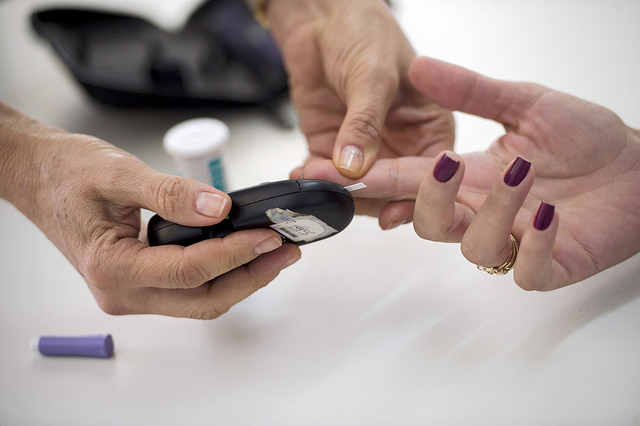Selective serotonin reuptake inhibitors (such as Prozac and Zoloft) are the most commonly prescribed medication for depression. SSRIs have long been associated with an increased risk of type 2 diabetes, in addition to numerous other side effects. Now researchers are beginning to understand why.
In a new study published in the Journal of Clinical Psychiatry, researchers found that for people without a history of diabetes, use of SSRIs was linked with reduced pancreatic insulin secretion, which may lead to a risk of developing diabetes. For those who already had type 2 diabetes, the risk of insulin dependence was significantly increased, which is associated with a higher risk of death.
“It is biologically plausible that SSRIs decrease insulin secretion and that this might, therefore, be a mechanism underlying the previously observed association between SSRIs and increased risk of type 2 diabetes. Consequently, type 2 diabetes patients treated with SSRIs might also have a higher risk to develop insulin dependence, a condition associated with an increased risk of mortality,” write the researchers, led by Dr. Raymond Noordam at the Erasmus University Medical Center in Rotterdam, Netherlands.
Previous research has found that the use of SSRIs is associated with lower insulin secretion. However, these studies were hampered by the lack of control groups, self-reported symptoms, and relatively few participants.

This new study aimed to solve those problems. The data comes from a study in the Netherlands that included a sample of thousands of older adults. Participants were followed from 1991 to 2012 and data were gathered throughout that time. Researchers were able to control for a number of variables, such as body mass index (BMI), depressive symptoms, and whether the person was taking glucose-lowering medications.
The researchers found that people without diabetes who were using SSRIs had lower insulin levels than those who were not taking antidepressants or those taking the older tricyclic antidepressants (TCAs). The researchers write that “current use of SSRIs was associated with a lower level of insulin, lower pancreatic insulin secretion (assessed with HOMA-β), and lower peripheral insulin resistance.”
The researchers also found that people with diabetes who were taking antidepressant medications were more than twice as likely to start insulin treatments than those who did not take antidepressants. The researchers write that “our data might suggest that progression of type 2 diabetes during the use of SSRIs is accelerated.” Given the higher mortality rate for those who require insulin treatments, this is a particularly alarming finding.
This particular study involved only older adults, so it is unclear whether these findings would apply to younger adults or children prescribed SSRIs. However, there is little reason to believe that the results would differ, particularly since the risk of developing diabetes has been noted in previous studies.
Researchers have cautioned against the use of antidepressant medications due to dangerous adverse effects. Antidepressants, including SSRIs, have been associated with a myriad of risks, including cognitive decline, gastrointestinal problems, sexual dysfunction, metabolic effects, weight gain, diabetes, abnormal bleeding, stroke, and death (particularly in older people). There is also evidence that clinical trials consistently underreport the harms of antidepressant medications.
This new study provides additional convincing evidence that although SSRIs are commonly believed to have fewer risks of adverse effects than TCAs, they still carry significant risk. This appears to be particularly relevant when it comes to patients with diabetes. Whenever antidepressant medication is considered, patients and prescribers should carefully weigh the potential risks and benefits.
****
Noordam, R., Aarts, N., Peeters, R. P., Hofman, A., Stricker, B. H., & Visser, L. E. (2016). Selective serotonin reuptake inhibitors decrease pancreatic insulin secretion in older adults and increase the risk of insulin dependence in type 2 diabetes patients. Journal of Clinical Psychiatry, 77(9), e1124–e1129. doi: 10.4088/JCP.15m10048 (Abstract)














Great article; But I’ve found a better natural and scientifically proven method that has worked so far and for many others as well. You can read more about it here http://bit.ly/2dB71F1. I hope it helps whoever needs it.
Report comment
Amber, the video you linked to seems like an infomercial. Care to summarize the strategy?
Anyway, I have pre diabetes which I indirectly blame on being on psych meds for years. I have found the best strategy which unfortunately, I haven’t been sticking to is to eat to my meter which means constant testing of my blood sugar levels to see which foods spike it. Usually, that will mean a high fat, low carb diet.
There is plenty of free information on this. Also google ketogenic diet as that can be helpful with metabolic issues.
The sad thing about being diagnosed with diabetes is just like with psychiatry, the only solution that doctors will offer you usually are meds. The diabetic educator that you are referred to will most likely suggest a healthy diet with lots of carbohydrates that will slowly cause your condition to deteriorate.
As I keep saying, psych meds are the gifts that keep on giving. And yes, I am being sarcastic.
Report comment